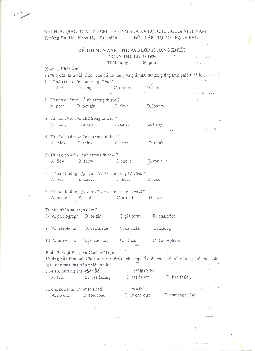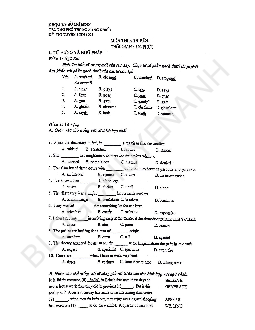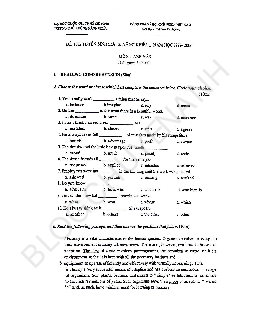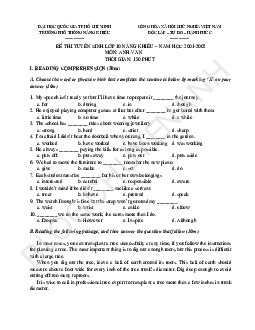





Preview text:
SỞ TPHCM
I. Choose the word/ phrase/ sentence (A. B, C or D) that best fits the space in each sentence
or best answers the question. (3.5 pts)
1. Which word has the underlined part pronounced differently from that of the others? A. national B. natural C. carry D. plane A. ˈnæʃənəl B.ˈnætʃərəl C.ˈkeri D.pleɪn
2. Which word has the underlined part pronounced differently from that of the others? A. innovated B. mended C. received D. celebrated A.ˈɪnəveɪtɪd B.mendɪd C. rɪˈsiːvd D.ˈseləbreɪtɪd
3. Which word has different stress pattern from that of the others. A. destruction B. mechanic C. interview D. environment A.dɪˈstrʌkʃən B.məˈkænɪk C.ˈɪnt̬ɚvjuː D.ɪnˈvaɪrənmənt
4. Which word has different stress pattern from that of the others. A. listen B. measure C. rubbish D. prevent A. ˈlɪsən B.ˈmeʒər C.ˈrʌbɪʃ D. prɪˈvent
5. “Let’s congratulate Nam _________ his excellent academic achievement.” Said the teacher. A. to B. of C. on D. in ●
congratulate sbd (on smt): khen ngợi ai về điều gì
6. Our school celebrated Children’s Day _________ June 1st two week ago. A. on B. in C. at D. to ●
Giới từ “on” chỉ thời gian thường được dùng để chỉ đích danh các thứ trong tuần, ngày
trong tháng và các ngày lễ có chứa từ “day”.
7. - Nam: “Have you ever enjoyed Tet, Maryam?”
- Maryam: “You mean the Lunar New Year? I once had a chance to be in Vietnam then, _________ I really like it.” A. or B. and C. so D. although ● Or: hoặc ● And: và ● So: do đó ●
Although: mặc dù ( đứng trước một mệnh đề)
8. - Bao: “Did you follow SEA GAMES 31, _________ held in Vietnam from May 12th to 23rd 2022?”
- Minh: “Of course, Viet Nam won over 200 gold medals.” A. who is B. which was C. that is D. when was ●
Đại từ quan hệ “which” thay thế cho “SEA GAMES 31”.
9. - Mark: “Viewers from the rural areas can get access to cable television, can’t they?”
- An: “Yes, there is _________ local and international programs on different channels.” A. lots of B. plenty of C. a variety of D. a number of ●
Lots of + N đếm được số nhiều hoặc không đếm được +V( chia theo chủ ngữ): nhiều ●
Plenty of + N đếm được số nhiều hoặc không đếm được +V( chia theo chủ ngữ): đủ và nhiều hơn nữa ●
A variety of + đếm được số nhiều/ không đếm được + V số ít : sự đa dạng của smt ( cũng
có thể +V số nhiều khi nghĩa của câu chỉ một tập hợp nhiều smt) ●
A number of + N số nhiều +V số nhiều: nhiều ●
The number of+N số nhiều + V số ít: nhiều
10. Our teacher suggests _________ waste paper for the school’s recycling scheme. A. colleting B. to collect C. being collected D. to be collecting ●
suggest doing smt: đề nghị làm gì
11. - Daisy: “What is your favorite place to _________?”
- Lucy: “Lemongrass Restaurant.” A. Run out B. eat out C. carry out D. fill in ● Run out: dùng hết, hết ● eat out : ăn ở ngoài ●
carry out: thực hiện, thi hành ● fill in: điền vào
12. Famers use animal dung to _________ their fields. A. make B. fertilize C. run D. develop ●
make (v): làm, chế tạo,... ●
fertilize (v): Làm cho phì nhiêu, làm cho màu mỡ (đất) ●
run (v): chạy, vận hành,... ● Develop(v): phát triển
13. - Thanh: “Why don’t you reduce the amount of water your family users?” - Nga: “_________” A. Nice idea! Ý hay đó B. Yes, please. Có
C. No, thanks. Không, cảm ơn
D. You’re welcome. Không có gì ●
Why don’t you +V: đưa ra lời đề nghị ( ý tưởng) --> A
14. - Chinh: “Congratulation! You scored a superb goal for our team.”“Chúc mừng! Bạn đã
ghi một bàn thắng tuyệt vời cho đội của chúng tôi. ” - Tung: “_________” A. Everybody does the same.
Mọi người đều có như nhau B.
B. It was the whole team’s effort. Thanks.Đó là nỗ lực của cả nhóm. Cảm ơn.
C. Yes, let’s. The crowd was fantastic. Vâng, chúng ta hãy. Đám đông thật tuyệt vời.
D. Thank you. Everybody can solve this problem.Cảm ơn bạn. Mọi người đều có thể giải quyết vấn đề này.
II. Look at the signs. Choose the best answer (A, B. C or D) for the question 15 and 16. (0.5 pt)
15. What does the sign tell you to do? Biển báo cho bạn biết bạn phải làm gì?
A. Pay attention when being on fire here. Chú ý khi bị cháy ở đây.
B. Extinguish fire inside. Dập lửa bên trong
C. Don't play with fire here. Đừng đùa với lửa ở đây.
D. Exit in the event of a fire. Thoát hiểm trong trường hợp hỏa hoạn.
16. What does the sign mean?Biển báo có nghĩa là gì?
A. Bad students will be punished at school.Học sinh hư
sẽ bị phạt ở trường.
B. Violence is not allowed at school.Không được phép có bạo lực ở trường.
C. Classmates should not talk too much to each
other.Bạn cùng lớp không nên nói quá nhiều với nhau
D. Younger students mustn't obey their monitors at
school.Học sinh nhỏ tuổi không được tuân theo sự giám
sát của chúng ở trường.
III. Read the following passage. Decide if the statements from 17 to 20 are True or False,
and choose the correct answers (A, B, C or D) for question 21 and 22. (1.5 pts)
Where did your water come from before it arrived in your kitchen? Is your glass of water as
new as this morning or as old as the dinosaurs? Is it even older than the dinosaurs? Water on
Earth is always moving round and round, like a wheel turning. This is called “the water
cycle," and it has no beginning or end. But to talk about it, we must choose a place to begin.
We will start with the oceans, the largest bodies of water on Earth.
In this part of the cycle, the sun heats the water in the oceans, and then the warm water
evaporates into the air. The water in the air eventually comes together to form very large
clouds, wind then moves the clouds over the land. When clouds finally meet cold air, the
water comes down in the form of rain or snow.
Some of this rainwater will stay on the land, but most of the water goes down into rivers and
streams. Finally, it goes back to the oceans, where the cycle begins again.
The water cycle is billions of years old. So, think again about how old that water in your cup
is. It’s much, much older than you thought. 17.
The oceans are the largest bodies of water on Earth. __T_____ ●
Key : We will start with the oceans, the largest bodies of water on Earth. 18.
Some of this rainwater will stay on the land, but most of the water goes down into
rivers and streams. Finally, it goes back to the oceans, where the cycle begins again.The
water cycle is compared to a wheel turning.____T___ ●
Key: Water on Earth is always moving round and round, like a wheel turning. This is
called “the water cycle," and it has no beginning or end. 19.
When you look at clouds, you are seeing the beginning part of the water cycle. ___F____
Key: This is called “the water cycle," and it has no beginning or end 20.
Water is made new every day. __F_____ ●
Key: Some of this rainwater will stay on the land, but most of the water goes down into
rivers and streams. Finally, it goes back to the oceans, where the cycle begins again.
21. Which of the following may be the best title for the reading passage? A. The beginning of the water B. Water on Earth C. The water cycle D. The age of water
22: In the reading passage, all of the following are mentioned EXCEPT _____ A. The sun makes water hot.
B. Water beautifies human life.
C. Water is used in the kitchen.
D. Clouds and cold air create rain. ● Key:
A đúng :the sun heats the water in the oceans
C đúng: Where did your water come from before it arrived in your kitchen?
D đúng: When clouds finally meet cold air, the water comes down in the form of rain or snow.
IV. Choose the word (A, B, C or D) that best fits the blanks space in the following passage. (1.5 pts)
My sister Susan and I were in the yard (23) ______ with our neighbors' dog last Saturday
afternoon when suddenly the sky turned dark gray. Minutes later, it began to rain heavily, so we ran quickly into the house.
Mom asked us to close all the windows. Just as I shut the window in the kitchen, we heard a
loud clap of thunder. Dad took us to the (24) ______ and asked us to keep calm. From there,
we could hear the strong wind outside. All of (25) ______ my sister was startled by a loud
crashing noise and started to cry. We tried to calm her down but she was very scared.
After a few minutes, the wind stopped and everything was quiet. We slowly made our way up
from the basement. The house was full of glass (26) ______ the broken windows. The real
damage was outside though. There were trees on the streets and there were damaged cars all
over. Our neighbors were very (27) _______ because they couldn’t find their dog. We (28)
______ everywhere and finally found him behind some bushes. He got wet all over but luckily was unhurt. 23. A. play B. played C. playing D. to be played 24. A. garage B. basement C. attic D. kitchen 25. A. a sudden B. suddenly C. an immediate D. Immediately 26. A. on B. up C. to D. from 27. A. tired B. satisfied C. horrible D. worried 28. A. searched B. phoned C. cried D. watched
23. Rút gọn mệnh đề quan hệ Ving ( “My sister Susan and I” là ch(n):ủ thể “play” ) 24. ●
garage /ɡəˈrɑːʒ/(n): nhà để xe ●
basement /ˈbeɪsmənt/(n): tầng hầm ●
Attic/ˈæt̬ɪk/ (n): tầng áp mái ●
Kitchen /ˈkɪtʃən/(n): nhà bếp 25.
All of sudden=suddenly: đột ngột
Immediately (adv): ngay lập tức 27. ●
Tired /taɪəd/ (a): mệt mỏi ●
satisfied /ˈsætəsfaɪd/ (a): cảm thấy hài lòng, thỏa mãn ●
horrible /ˈhɒrəbəl/ (a): kinh khủng, ghê rợn ●
Worried /ˈwʌrid/ (a): lo lắng, bồn chồn 28. ●
search/sɜːtʃ/ (v): nghiên cứu ●
phone/fəʊn/(v): gọi ( điện thoại) ● cry /kraɪ/(v): khóc ● Watch /wɒtʃ /(v): xem
V. Use the correct form of the word given in each sentence. (1.5 pts)
29.Her father learned that the house was for sale through an _advertisement_____.(advertise)
30. Physical exercise is ___beneficial_______to our health. (benefit)
31. In the speaking examination, answers are presented __orally_______on tape. (oral)
32. She's just had an article _published_____in the Tuoi Tre. (publish)
33. Tsunami is a natural _disaster_______that can cause great damage. (disastrous)
34. I like watching the news on TV every day because it’s very __informative___. (inform) 29. ●
Advertise/ˈædvətaɪz/ (v):Quảng cáo (hàng) ●
advertisement /ədˈvɜːtəsmənt/ (n) Sự quảng cáo; bài quảng cáo (trên báo, trên đài...),.. ●
advertiser /ˈædvətaɪzə/ (n): Người quảng cáo; báo đăng quảng cáo; tờ quảng cáo, nhà
quảng cáo, đơn vị quảng cáo ●
advertising /ˈædvətaɪzɪŋ/ (n):Sự quảng cáo, nghề quảng cáo
Sau “an” cần một danh từ 30. ●
Benefit/ˈbenəfɪt/ (n): Lợi, lợi ích, phúc lợi,... ● (v): có lợi cho ●
beneficial to smt/sbd /ˌbenɪˈfɪʃəl/ (a):Có ích; có lợi; tốt ●
beneficiary/ˌbenəˈfɪʃəri/ (a): Người hưởng hoa lợi 31. ●
Oral /ˈɔːrəl/ (a): Bằng lời nói, nói miệng ● Orally (adv)
Sau verb cần một trạng từ bổ nghĩa 32. ●
Publish/ˈpʌblɪʃ/(v): Xuất bản (sách...); đưa xuất bản
Sử dụng rút gọn mệnh đề quan hệ --> được sản xuất --> pulished 33. ●
Disastrous /dɪˈzɑːstrəs/(a): Tai hại, thảm khốc ●
disaster /dɪˈzɑːstə /(n): thảm họa
Sau “a” cần một danh từ/cụm danh từ --> disaster
VI. Rearrange the groups of words in a correct order to make complete sentences. (0.5 pt)
35. Most students tried/ Entrance exam / to concentrate / for the coming / on studying . /
Most students tried to concentrate on studying for the coming Entrance exam. ●
Try to do smt: cố gắng làm gì
36. Global warming / that happens / over many, many years / is a slow change . //
Global warming is a slow change that happens over many, many years.
VII. Finish each of the following sentences in such a way that it means almost the same as
the sentence printed before it. (1.0 pt)
37. How long have you been learning English?
When did When did you start to learn English? ●
Start to do smt : bắt đầu làm gì
38. The students spent ten minutes waiting for their bus.
It took the students ten (10) minutes to wait for their bus. ●
S+(Spend) + time + Ving smt: dành thời gian làm gì đó ●
It (take) sbd + (time) +to+ V: tốn bao nhiêu thời gian để làm gì đó
39. My uncle will send for a mechanic to fix his car tomorrow.
My uncle will have his car fixed (by a mechanic) tomorrow ●
S+ have smt + V-ed/ PII ...by sbd: nhờ làm gì
40. “What about teaching the children how to cope with an emergency?” said Mrs. Thu.
Mrs. Thu suggested that the children (should) be taught how to cope with an emergency. ●
S + (suggest) that + clause: Đề xuất rằng ai đó nên làm gì đó.




